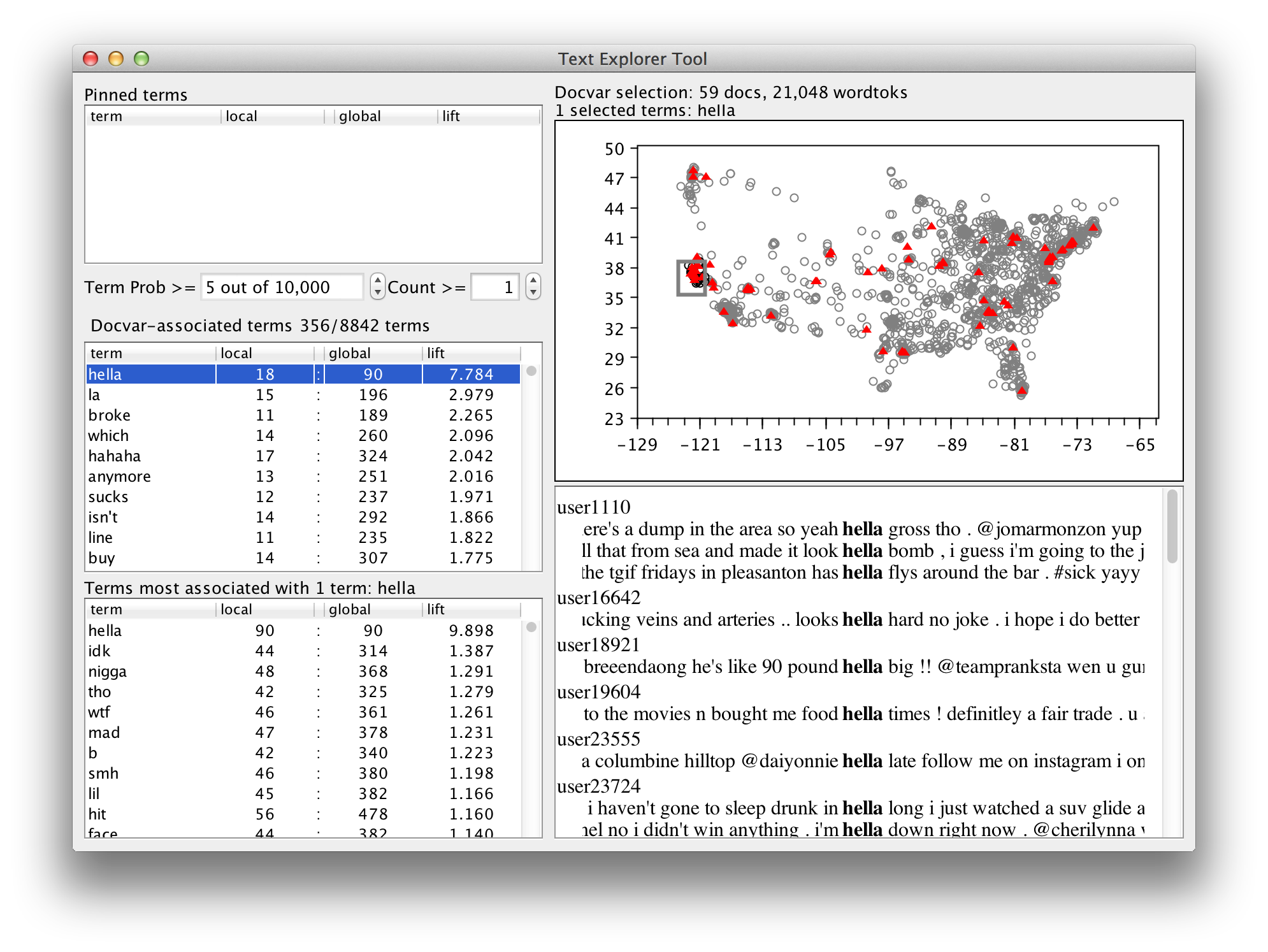
Website: brenocon.com/mte

The Mutual information Text Explorer (MTE) is a tool that allows interactive exploration of text data and document covariates. See the paper or slides for information. Currently, an experimental system is available. It is very buggy, use with caution, etc etc. Contact brenocon@gmail.com (http://brenocon.com) with questions.
Get the application: mte.jar
Get one of the example datasets: bible.zip or sotu.zip.
Launch it with one argument, the configuration file of the corpus you want to view. For example:
java -jar mte.jar sotu/config.conf
This requires Java version 8 to be accessible from the commandline. Check the version with java -version; it must be at least "1.8.0".
(Sometimes, you might have to give a flag to specify memory usage, like java -Xmx2g. I'm not sure when this is necessary.)
Each line is one document, encoded as a JSON object. There is one mandatory key:
text: a string of the document's text.There is one optional special key:
id (or docid): a string that is a unique identifier for this document. Not necessary for simple usage.Other keys in the JSON object are covariates.
They have to be listed in the schema configuration to be used.
TODO: automatic type detection
TODO: covariates in separate file and CSV
The application is launched by giving it the full path to the main config file. For an example to adapt to your own data, start with bible/config.conf.
Required configuration parameters include:
data: the filename of the data. Either absolute, or relative to the config file's directory.schema: an object that describes the types of the covariates; see below. Or, a filename for an external schema config.x, y: which covariates should be the x- and y-axes.Other configuration parameters include:
tokenizer: what tokenizer to run. Options are
StanfordTokenizer, which is good for traditionally edited text. (Default.)SimpleTokenizer, which tokenizes only on whitespace. If you want to run your own tokenizer, an easy way to use it is to encode your tokenization into the text field by putting spaces between the tokens, and then use SimpleTokenizer. On real text, this tokenizer gives poor results. But it is fast.nlp_file: this is an alternative to tokenizer. It says you don't want the application to run any NLP routines, and instead read off all NLP annotations from an external file. It relies on the id document identifiers in order to merge the annotations against the text and covariates. I don't have documentation for the format, but it is produced by this. Currently this is the only way to get part-of-speech and named entity annotations into the system.In the schema object (or schema config file), every key is the name of a covariate, and the type is given. Legal types are
number, for a numeric variable (either integer or floating point is fine).categorical, a categorical variable (a.k.a. discrete, or what R calls a factor).
In the data, the values for a categorical variable are represented as
strings. In the schema, you can optionally specify a list of possible
values. The ordering you give will be the order it is displayed in. See
bible.zip for an example.TODO: reconcile with / extend to http://dataprotocols.org/json-table-schema/ which seems to be a moderately sensible data column typing system (are there better ones? there are certainly many worse ones.)
The format for the config file is a lax form of JSON, described here. Any legal JSON can be used for the config file; it has a few niceties like commenting with #, being able to sometimes skip quoting, and leaving off commas when using a separate line per entry.
License is GPL v2 or later. I'd be happy to do BSD/MIT or something, but the software uses some GPL'd libraries which I find convenient.
Code is at github.com/brendano/mte.
Dependencies have to be placed in lib/ for ./build.sh to work.
For development in an IDE, I just manually add them to the build path.
I've placed a copy of them here: mte-deps.zip.
The dependencies are currently:
config-1.2.1.jar
docking-frames-common.jar
docking-frames-core.jar
guava-13.0.1.jar
jackson-all-1.9.11.jar
myutil.jar
stanford-corenlp-3.2.0.jar
trove-3.0.3.jar